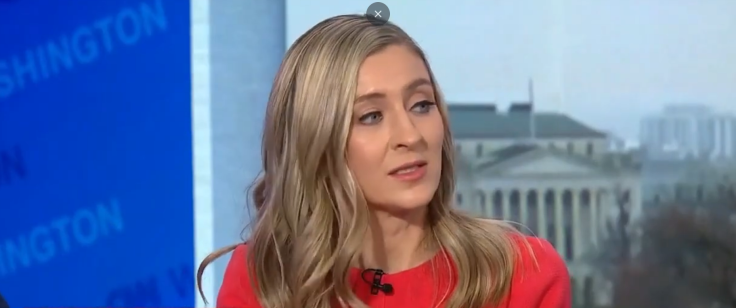The 'Piggy' Incident: Who Is Catherine Lucey, the Reporter Trump Targeted Over Epstein Files?
Catherine Lucey sparks uproar after Trump's 'piggy' reply to Epstein question.

Aboard Air Force One last week, President Donald Trump drew criticism after insulting Catherine Lucey, a female journalist working for Bloomberg, during a press exchange. The exchange, now widely referred to as the 'Piggy' incident, has renewed the debate over Mr Trump's treatment of women in the media and the broader issues of respect and accountability in political journalism.
A Heated Exchange on Air Force One
QUIET PIGGY!!
— Occupy Democrats (@OccupyDemocrats) November 18, 2025
Trump crashes out and derails a reporter with a stern comment! This is the President of the United States. This is how he talks to the press and other adults that he is supposed to lead.
America can do so much better! pic.twitter.com/NygY1Sm2In
The confrontation unfolded mid-flight when Bloomberg White House correspondent Catherine Lucey pressed Mr Trump about recently released documents related to Jeffrey Epstein. The files included emails suggesting links between the disgraced financier and prominent public figures, prompting widespread calls for full transparency.
As Lucey attempted to question Mr Trump about whether the unsealed emails implicated him, he abruptly cut her off, wagged his finger, and told her, 'Quiet, piggy.'
The exchange was partly captured on video and swiftly circulated on social media, prompting widespread reaction in political circles. Journalists on board reported that Mr Trump appeared agitated by the question and sought to redirect attention towards his political opponents.
When pressed again later that weekend, he defended his remarks, calling Lucey 'the worst' and criticising Bloomberg News. His remarks drew immediate condemnation from journalists, editors, and advocacy groups who viewed the outburst as a deliberate attempt to humiliate a female reporter for doing her job.
Catherine Lucey's Profile and Career
Catherine Lucey is a veteran political journalist with over two decades of experience covering national politics and the presidency. She currently serves as a White House correspondent for Bloomberg News, one of the few journalists still travelling regularly with the presidential press pool. Before joining Bloomberg, she spent years at the Associated Press, where she became known for her direct and informed questioning style.
Throughout her career, Lucey has reported from major world capitals, including Washington, London, and Dublin, covering elections, policy debates, and international diplomacy. Her reputation among colleagues is that of a calm yet incisive journalist committed to factual accuracy.
This was not her first contentious exchange with Trump; in 2018, she was the first reporter to challenge him publicly over hush money payments made to adult film actress Stormy Daniels, an inquiry that later proved pivotal in a federal investigation.
Despite the uproar over the Air Force One incident, Lucey has refrained from commenting publicly. Bloomberg issued no immediate statement, though the network's editorial leadership reportedly expressed support privately.
Former colleagues at the Associated Press and The Wall Street Journal have defended her composure, noting that her professionalism made her an easy target for a president known for vilifying members of the press.
Backlash and Political Fallout
Trump calling Bloomberg's Catherine Lucey a "piggy" for acting obnoxious after being graciously allowed on Air Force One is actually one of the better things he's said in the past week.
— National Conservative (@NatCon2022) November 18, 2025
This will resonate with Americans who recognize that the US media is trash. pic.twitter.com/iZjNspbu0H
The backlash to Mr Trump's insult was swift and widespread. Media figures across the political spectrum, from CNN's Jake Tapper to former Fox News anchor Gretchen Carlson, condemned the comments as sexist and demeaning.
The Guardian reported that advocacy organisations described such insults as part of a pattern, aimed at silencing and intimidating women journalists. Veteran broadcaster April Ryan, herself a past target of the Trump administration, told reporters that this behaviour demeaned the presidency and undermined public trust in the office.
International responses mirrored the domestic outrage. Italian newspaper L'Unione Sarda described the remark as "vulgar, humiliating, and unbecoming of any leader," while Canadian and British outlets highlighted the incident as emblematic of Mr Trump's combative approach towards the press.
Behind the ensuing criticism lies a larger political struggle over the Epstein case. Trump had initially opposed releasing unclassified files but later reversed course, stating publicly that his administration had 'nothing to hide.' Critics contend that his outburst revealed discomfort with ongoing scrutiny over his historic associations with Epstein, an issue that continues to cast a shadow over multiple public figures.
A Defining Moment for Press Freedom

The "Piggy" incident is more than a fleeting viral controversy; it touches the heart of the relationship between power and accountability. By berating journalists during official duties, political leaders risk eroding the standards that underpin a democratic society.
While Trump's allies downplay the confrontation as a moment of frustration, it has already become a defining flashpoint in the ongoing conversation about gendered hostility in politics. For many journalists, the episode serves as a reminder that professionalism must endure even when civility does not.
© Copyright IBTimes 2025. All rights reserved.




















